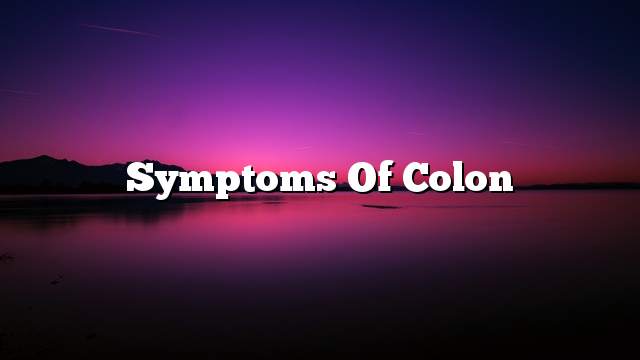Colorectal disease
It is the medically recognized name of the inflammation that afflicts the inner wall of the large intestine, accompanied by abdominal pain accompanied by diarrhea, constipation, bloating, and intestinal gas, usually due to many factors such as those related to the nature of the food eaten by the person, Hereditary, or because of mental trauma such as anxiety, and of the types: bacterial colitis, and allergic.
Symptoms
There are a range of symptoms that indicate that a person is suffering from colitis, namely:
- Pain in the abdomen: The patient begins to feel abdominal pain, gradually increasing severity due to increase or stop the movement of the large intestine, and is associated with the pain of diarrhea, or constipation, and usually the patient to reverse the condition that he suffered at the beginning of feeling the pain of the colon, if he has diarrhea , Will then become constipated, and vice versa.
- The constant need to go to the toilet: The patient feels the colon constantly needs to go to the toilet for more than once during the day, until the cause of inflammation disappears.
- Excess mucus or blood with feces: Advanced cases of colitis may accompany mucus discharge, or blood accompanied by stool, and in this case you should consult your doctor immediately, to remedy this condition that may be due to a serious cause.
- Feeling dry: The patient feels a bit of dryness in the throat area, especially the person with constipation, or after a long diarrhea, and needs to treat this viewer, drinking enough water, to ensure the maintenance of the level of the body.
- Change in body temperature: Often the patient feels high temperature, may lead to sweating continuously.
Diagnosis and causes
The doctor diagnosed the condition of the patient with the colon based on the symptoms associated with him, and then ask him about the conditions before the occurrence of colitis, such as: the question of the nature of the food he ate, such as legumes, or dairy products, or hot foods, which lead to pain In the colon, and also asks about the patient’s mental state, such as anger, fear, or anxiety, and the main cause of the psychological condition.
Treatment
When treating a colon, the doctor usually requires the patient to perform an analysis of stool to make sure that it is free from any type of bacteria, or viruses, and describes some of the medicines that help to calm the pain of the colon, and depends on the factors causing it, including: The intestine may be used to dispose of stool in the case of constipation. The doctor may use the endoscopy device, which is equipped with an accurate camera, to photograph the large intestine (colon) to diagnose the nature of its movement, the cause of inflammation, and in advanced cases, With the same symptoms E, the patient may need to be a doctor or a psychotherapist, to help him get rid of the psychological causes of Adthab colon.
